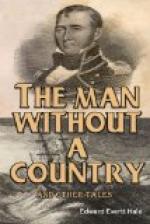The truth is, that this vision was not in itself a delusion, nor, indeed, half bright enough. If one could only have been left to do his own business, the vision would have accomplished itself and brought out new paraheliacal visions, each as bright as the original. The misery was and is, as we found out, I and Polly, before long, that besides the vision, and besides the usual human and finite failures in life (such as breaking the old pitcher that came over in the “Mayflower” and putting into the fire the Alpenstock with which her father climbed Mont Blanc),—besides these, I say (imitating the style of Robinson Crusoe), there were pitchforked in on us a great rowen-heap of humbugs, handed down from some unknown seed-time, in which we were expected, and I chiefly, to fulfil certain public functions before the community, of the character of those fulfilled by the third row of supernumeraries who stand behind the Sepoys in the spectacle of the “Cataract of the Ganges.” They were the duties, in a word, which one performs as member of one or another social class or subdivision, wholly distinct from what one does as A. by himself A. What invisible power put these functions on me, it would be very hard to tell. But such power there was and is. And I had not been at work a year before I found I was living two lives, one real and one merely functional,—for two sets of people, one my parish, whom I loved, and the other a vague public, for whom I did not care two straws. All this was in a vague notion, which everybody had and has, that this second life would eventually bring out some great results, unknown at present, to somebody somewhere.
Crazed by this duality of life, I first read Dr. Wigan on the “Duality of the Brain,” hoping that I could train one side of my head to do these outside jobs, and the other to do my intimate and real duties. For Richard Greenough once told me, that, in studying for the statue of Franklin, he found that the left side of the great man’s face was philosophic and reflective, and the right side funny and smiling. If you will go and look at the bronze statue, you will find he has repeated this observation there for posterity. The eastern profile is the portrait of the statesman Franklin, the western of poor Richard. But Dr. Wigan does not go into these niceties of this subject, and I failed. It was then that, on my wife’s suggestion, I resolved to look out for a Double.
I was, at first, singularly successful. We happened to be recreating at Stafford Springs that summer. We rode out one day, for one of the relaxations of that watering-place, to the great Monson Poorhouse. We were passing through one of the large halls, when my destiny was fulfilled!
He was not shaven. He had on no spectacles. He was dressed in a green baize roundabout and faded blue overalls, worn sadly at the knee. But I saw at once that he was of my height, five feet four and a half. He had black hair, worn off by his hat. So have and have not I. He stooped in walking. So do I. His hands were large, and mine. And—choicest gift of Fate in all—he had, not “a strawberry-mark on his left arm,” but a cut from a juvenile brickbat over his right eye, slightly affecting the play of that eyebrow. Reader, so have I! My fate was sealed!




